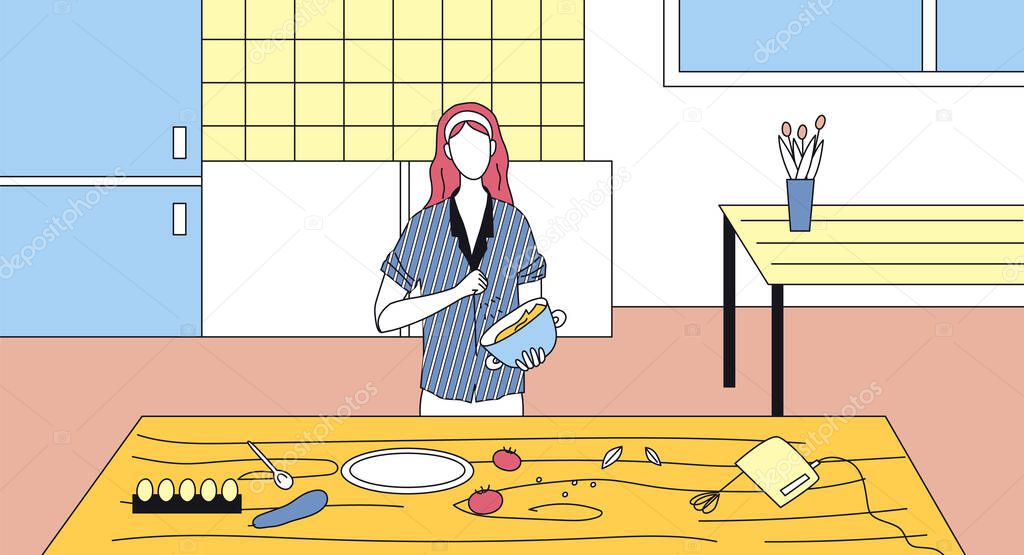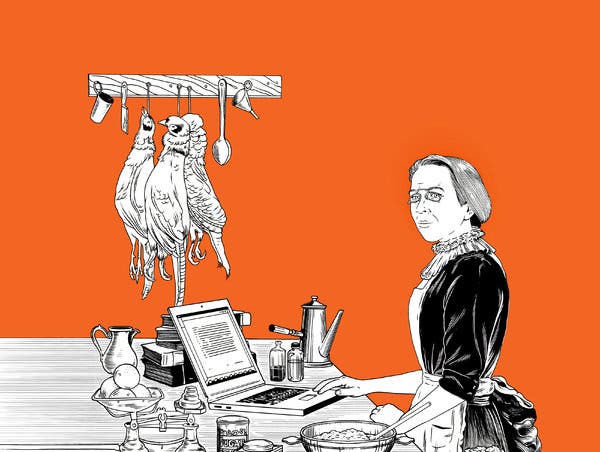Editor’s Note: FII’s #MoodOfTheMonth for January, 2022 is Our Evolving Relationship With Feminism. We invite submissions on the many changing aspects of the feminist discourse, throughout the month. If you’d like to contribute, kindly email your articles to sukanya@feminisminindia.com
As a kid, I remember the toys I had. Along with usual misshaped dolls, it included a collection of mismatched tiny plates, plastic spoons and little steel utensils which fit nicely on a tiny steel stove, all together forming a full “kitchen set”. Although nothing like the fancy kitchen sets that are available now on the numerous shopping sites (listed under the “for Girls” category), I did love my playset.
This love for the kitchen set though, did not linger for too long. The kitchen set was put aside for the books and other endeavors of an 8-year-old. For some reason, they could not co-exist.
As the pandemic captured our minds and lives, restricting our activities to the walls of our home, we were forced to un-restrict our minds to adapt to the new realities. For many of us, this involved managing some basic skills too. My cooking skills until this point were restricted to boiling rice, making Maggi and tea. A troubled mind, while filling up your brain, does little for your stomach. That one still needs the external reinforcement.
After enduring the cooking of the husband and father-in-law for a couple of days, I decided to capture my fears. Unluckily for me, this desire of conquest brought on some devastation too. A burnt Puliyogre is not too pleasurable to ingest. For the uninitiated, Puliyogre is one of the most basic dishes one can make with very little scope to mess it up. Why was cooking a meal so hard?
The incessant need for a girl to be adept at cooking seemed to be the last straw to cement this notion and push me further away from the kitchen set. It was a way for me to demonstrate my defiance and raise a silent protest against these expectations. But now, thanks to the pandemic, I was exposed to a new scenario which held the potential to challenge this defiance and I was terrified by it

As a kid growing up, I was in a household that encouraged me to study and pursue a career. The 8-year-old me grew up and so did my opinions and prejudices. Meanwhile, the kitchen set that was cast aside seemed to move further and further away. Armed with an education and a job in tow, the idea of cutting vegetables and adding a tadka seemed dreary enough.
A friend once recollected her experience meeting a prospective spouse and being asked “Do you cook?”. She replied, “I suppose I would be good at boiling water. Never tried”.
The incessant need for a girl to be adept at cooking seemed to be the last straw to cement this notion and push me further away from the kitchen set. It was a way for me to demonstrate my defiance and raise a silent protest against these expectations. But now, thanks to the pandemic, I was exposed to a new scenario which held the potential to challenge this defiance and I was terrified by it.
Armed with the recipes given by my mother written on loose notes, I began my foray into the kitchen. The initial ones were carried out much like a careful experiment – measuring everything twice, checking the timer with every turn and stirring it incessantly, all the while anticipating a burnt dish. But as the quote goes – “Practice is the best of all instructors”.
Also read: ‘Roti Making Is A Loaded Process’: Reflections On Labour & Patriarchy From The Kitchen

It is important to underline unpaid domestic labour and build awareness about the problematic normalisation of the same. Cooking a meal for your family and loved ones is not wrong but it is important to distinguish between servitude and dignified domestic labour that is not based on gender roles. The goal is equal opportunity, responsibility and ownership
The ones like me are perhaps a small number, who are able to have an ecosystem that ‘allows‘ them to lead a life away from their kitchen sets. As the toy sets that get marketed as “High-grade kitchen sets for little girls”, life gets sold to an adult woman with the well-equipped kitchen. Looking at the innumerable women who are lost and almost indistinguishable from the paraphernalia in the kitchen, it is but natural for us to sprint away as fast as possible from this eventuality.
It took me time to adjust my mind to accept that I was spending my time, cooking in the kitchen. Somehow, I had imagined it always as a compromise. But as I experienced the process of learning to cook, I grudgingly started to enjoy it. The sound, smells and the touch, all were pleasing. It is after all an art in its own right.
With no intention of glorifying the effort and time spent in the kitchen, it was in some ways, a relaxing experience. But why did I have to feel good about this experience which I so detested?

The subject of the woman in the kitchen is up for discussion very often and involves passionate debates. Rightfully so, too. Quantifying the time and effort that goes into several years of unpaid work in the kitchen and household chores would easily run into millions in all currencies worldwide, even the most valued ones too.
It is important to underline unpaid domestic labour and build awareness about the problematic normalisation of the same. Cooking a meal for your family and loved ones is not wrong but it is important to distinguish between servitude and dignified domestic labour that is not based on gender roles. The goal is equal opportunity, responsibility and ownership.
This process of learning a basic life skill during the pandemic taught me that my books and my kitchen set could co-exist. If I enjoy something, I should indulge myself in it. It is definitely about having the agency to make that choice. The act of cooking in itself is not unfeminist, it is the context that makes it so.
About a year after my precarious entry into the kitchen, I decided to make Obbattu (Puran Poli). While it demanded quite some hard work, I was pleased with myself. One, because I truly believed it to be a complex dish for my caliber. And more importantly, it was one of the favorite sweets of my mom. Throughout our lives, she has been making sure that each of our favorite items is prepared through the year. It is perhaps time to do things differently. That kitchen set did serve me well!
Also read: Bread Of Life: The Making Of Roti And The Politics Around It
Vijetha is from Bangalore and has been part of the corporate software industry in different roles for the past 15 years. She has now taken a break from work to give herself some time and pursue other interests
Featured Image Source: The New York Times





This is so so relatable Vijeta! Thank you for writing this!
I firmly believe – cooking is a crucial life skill, a way to care for your loved ones and a way to stay close to our roots. Since when did any of these become gendered?
Today – people are so proud to say they can’t cook anything other than maggi and I was that person. We wouldn’t be so proud of not knowing any other life skill, lets say driving, would we? The ‘rebel’ mindset robbed me of decades of my life where I thought anything to do with the kitchen was uncool and unfeminist.
I firmly believe that atleast for the reason that it is a lifeskill – everyone should know some basic cooking – any gender. COVID has taught us that. Beyond that, like you rightly said, is a question of agency!
Cooking isn’t unfeminist in itself, the context makes it so. Very well put.